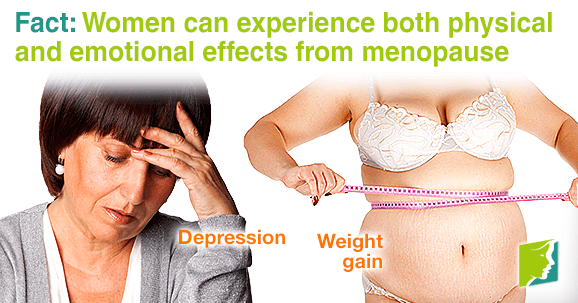Unfortunately, nearly all women experiencing menopause will be affected by at least one menopause symptom. Naturally occurring fluctuations of the sex hormones estrogen and progesterone primarily account for the majority of menopause symptoms including fatigue, headaches, weight gain, breast pain, vaginal dryness, hot flashes, and mood swings. The stage preceding menopause, where a woman still experiences periods, is known as perimenopause and can last anywhere between 2-8 years. Menopause itself however, is defined as the time when a woman hasn't received a period for 12 months. Read on to discover the truth behind some common myths and facts about menopause symptoms.
Myth: After menopause, a woman's body stops producing hormones
FACT: A woman's body hormone production rates only decreases after menopause
A woman's body undergoes multiple alterations during the menopause transition and its sister phases, (i,e.,premenopause, perimenopause, and postmenopause). While the changes can be both physical and mental, they are almost always caused by estrogen and progesterone fluctuations. Although it's true that hormone production rates do significantly decrease after menopause, they don't ever stop entirely.
Myth: Menopause only affects women physically
FACT: Women experience both physical and emotional menopause symptoms
In addition to physical alterations, such as vaginal dryness, hot flashes and weight gain, emotional conditions including depression, anxiety, and irritability are also common experiences for menopausal women. Both physical and mental changes however, are the consequence of fluctuating hormones.
Myth: Menopausal women are not interested in sex
FACT: Around two-thirds of women aged 50-79 remain satisfied by their sexual activity
Hormone fluctuation does not have to result in women losing interest in sex. However, because vaginal dryness is a common symptom of the menopause and can result in a decreased sex drive, it is recommended that women use water-based lubricants in order to decrease the chance of painful and unpleasant sex.
Myth: Weight gain is inevitable during menopause
FACT: Weight gain can be prevented during menopause
Whilst it's more likely to occur during menopause, weight gain is not an inevitable symptom of the transition. In order to counteract the effects of a slower metabolism, it is recommended that women exercise at least three to five times a week and maintain a healthy, balanced diet. Engaging in aerobic exercise such as swimming, walking, and biking is also advisable when trying to ward off unwanted weight gain.
Myth: Most women should take hormone replacement therapy for menopause symptoms
FACT: Hormone replacement therapy is not advisable for every woman
During the 1960's the number of women taking hormone replacement therapy (HRT) spiked as it was thought to be a cure-all for menopausal symptoms. However, evidence has since emerged that HRT can significantly increase the risk of heart disease, stroke, breast cancer, and blood clots. As a result, doctors today are cautious about prescribing HRT. Although the menopause comes accompanied by many frustrating symptoms, it is important to know you are not experiencing them alone. They also don't have to just be put up with; there are many helpful natural remedies for menopause symptoms.
Sources
- National Center of the Complementary and Alternative Medicine. (2012). Menopausal Symptoms and Complementary Health Practices. Retrieved August 6, 2014, from http://nccam.nih.gov/health/menopause/menopausesymptoms
- Office on Women's Health. (2010). Menopause. Retrieved August 6, 2014, from http://womenshealth.gov/menopause/symptom-relief-treatment/natural-alternative-treatments-lifestyle-changes.html
- University of Maryland Medical Center. (2012). Menopause. Retrieved August 6, 2014, from http://umm.edu/health/medical/reports/articles/menopause




